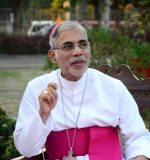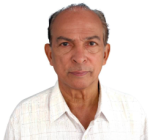Indore: Sr. Cini George has only one mission — to incense the world with positive energy. The 38-year-old sister is a member of the Congregation of Missionary Sisters Servants of the Holy Spirit.
George was diagnosed with multiple sclerosis at age 27. Later it dawned on her that cosmic energy can transform and retransform all that is in it. This realization convinced her about the need to spread positive energy throughout the world.
Confined to bed since April 2013, the ever-smiling nun is working on three books, including two novels. She works on a laptop placed on a small moveable multipurpose flat table.
The laptop is her good friend. It acts as a note book, television and spiritual assistant. (George listens to Mass, hymns and spiritual talks on it.)
She is paralyzed below her waist but has sensation there. Her hands have gone weak so she uses a speech recognition program to give the final touches to her unfinished books.
None of these handicaps can dampen her spirit in living her vocation in its fullness, though. She is currently staying at the headquarters of the congregation’s Central Indian province at Indore, the commercial capital of the central Indian state of Madhya Pradesh.
She shared with Global Sisters Report her struggles and mission.
How can you look so cheerful?
You know there is no reason for me to be unhappy as I understand God wants me to make whatever contribution I have to make. It is the will of God and I have accepted it happily. There is no reason for me to be otherwise. I am a missionary — in bed or on foot. To be a missionary for me is to become a cheerful giver. As for me, I live my call in the firm belief that the one who called me is faithful and all that I need is to remain open to him.
Besides, the knowledge that I am a passing reality on this earth consoles me. Also my disease — it will also pass — either by itself or with my body. It is a fact, a truth. The battle of life continues either with MS or without MS. Awareness of this reality liberates me from the clutches of all unnecessary desires. You know desire is the root cause of all sufferings, even Lord Gautama Buddha has said it.
Have you never felt unhappy after being confined to bed?
No — no, not like that. I had lots of struggles accepting my disease. In the first three months it was very tough for me to accept that I lost my capability to walk. I just could not just imagine a life confined to a bed. [Pointing out to a portrait of the Sacred Heart of Jesus on the wall facing her], I prayed to the Sacred Heart of Jesus and gradually I realized that he suffered more than me, and compared to his suffering [crucifixion], mine is nothing. Once I got this realization, I was never sick-minded and disappointed. Obviously, my body is sick.
Now, I am happy in whatever position I am. All these struggles helped me grow more serene. I pray daily to Jesus to help me continue to live my vision, to reflect my Jesus’ love and compassion. I know he loves me dearly. When I am alone I talk to Jesus just like friends. My prayer too is simple conversation with him. He is my constant companion. I hear his voice especially through the word of God.
I know there are many more people who suffer much more than I do. The comforts that I enjoy — an air-conditioned room, two women caretakers, a comfortable bed — give me no reason to say that I suffer. It would be a sin if I said so.
What is so special about it, the portrait of the Sacred Heart?
This portrait has been with me since I joined the convent [in June 1994]. It is a constant companion and I used to share all my worries and problems with it. When I am alone I always talk to the Sacred Heart. Jesus is my constant companion.
You say that your mission is to spread positive energy in the world. What motivated you to undertake such a mission?
There are both positive and negative energies in the world. The negativity is a passing phenomenon, but the positivity is permanent, as it is God himself. Therefore, spreading positivity is nothing but reaching the love of Christ to others. I know I will fade away, but the positivity I leave behind will continue to exist even after my death. Jesus, too, did the same thing. He died on a cross, and his message of love and compassion still continue to influence millions of people. Obviously, I cannot do what Jesus did.
You see, today’s world is filled with the filth of greed, licentiousness, aggression, religious fanaticism and other evil trends. I believe the whole cosmos is one and we are all interconnected with breath that we breathe. When I send positive energy, someone somewhere might receive grace from it.
How do you carry out your mission?
Yes, it is true I cannot walk anymore and go to people. But I can use technology. I have over 300 friends on Facebook. I am also connected to so many people through my mobile [phone]. People call up and ask me for prayers. I also pray for terrorists and others creating trouble in the world. I have also written three books to convey my messages.
Until my finger movements got restricted I edited our house magazine, “Rays,” and made small statues with clay and hay and even wrote poems and articles.
Were these books written after you were confined to bed?
No. The first book titled Life through MS, Multiple Sclerosis, was written between 2010 and 2012. I want all the MS patients and others to understand that we are a passing reality.
Can you please explain the meaning of the book’s cover page?
The cover shows the sunlight falling on a rose plant that is being eaten by a dark worm. Even after the worm began eating the plant, the rose is still blooming and spreading its fragrance and attracts others. Even at the point of dying the sun gives life to the rose through its rays. This is exactly my life. I know I am dying. But still God has given me strength to spread the message of love, even being on this bed within the available facilities and capacity. It is not time for me to worry.
What about other books?
I have written novels. One is titled Pass on Genuinely and conveys the message that women aren’t weak or lesser privileged. If helped, they can make a difference to society. The second novel, Malkkad Women communicates the message that women in concord have strength and can help create a great impact in society.
What prompted you to take up writing?
Nothing. I just felt that I could contribute something to society substantially.
How long did you take to finish each book?
I am not exactly sure. But about 2 to 3 years and two are still being edited. One has been sent to a publisher.
How do you find support from your sisters?
I have no words to express my gratitude to my congregation that takes care of me fondly. I am truly indebted to them.
How do your sisters take care of you?
All my physical and spiritual needs are taken care of, even without my asking. All my sisters visit me whenever possible and remain with me especially when I am in pain. Their prayer vibes are great support for me. The care and concern from my sisters, friends, relatives are indeed great. My sincere salute to them all.
Could you talk about finding out you were sick?
It was in April 2005. As a junior nun I was working in one of our schools in Rajkot, Gujarat state [in western India] as an accountant. I gradually developed symptoms of numbness, burning sensation on my legs.
Initially, I did not take it seriously and continued my activities. Further I began to lose my balance and suffer sleeplessness. I had a fall that tore some ligaments in my right ankle. I was asked to rest for three months. I then developed numbness below the neck and was taken to our own hospital. There, the doctors diagnosed me with MS.
How did you react?
Obviously I was shocked and it took time for me to accept. I was admitted and administered steroids. There I felt loneliness, and the four walls became my friends, though the sisters often visited me. The stillness of the walls began to talk to me, I cried and then I could enter into a deeper self and I surrendered.
Since you were a junior sister, did you face any objection from the congregation?
No problem from the congregation. But I was worried — whether I would be allowed to continue in the convent. However, my provincial assured me of her support. In April 2008, I took my final profession [of vows].
What did you do then?
I was transferred to Dharampuri in Madhya Pradesh. It was a village that gave me lot of life and meaning to my missionary life. I used to teach in the school and took tuition for students. I also visited families. As my health deteriorated slowly I returned to Indore.
I did a course on guidance and counseling [from an open university] and was appointed to St. Raphael Primary School in Indore as counselor. After a year I began using a walker. During those years I also read many inspirational books such as The Gentle Art of Blessing by Pierre Praderand and Secret by Rhonda Byrme.
What is your message for society?
I deeply wish that we all realize that ‘we’ are not just ‘persons’ but persons with immense power to create and recreate our own environment. Yes, nothing, not even our vulnerable body, can stop us from living joyfully our commitment except ‘we’ ourselves. Another factor we ought to remember is: It’s not sympathy a patient needs, but empathy.
[Saji Thomas is a freelance journalist based in Bhopal, a central Indian city. He has worked for several mainstream newspapers such as The Times of India. This article is part of a collaboration between GSR and Matters India, a news portal started in March 2013 to focus on religious and social issues in India.]










